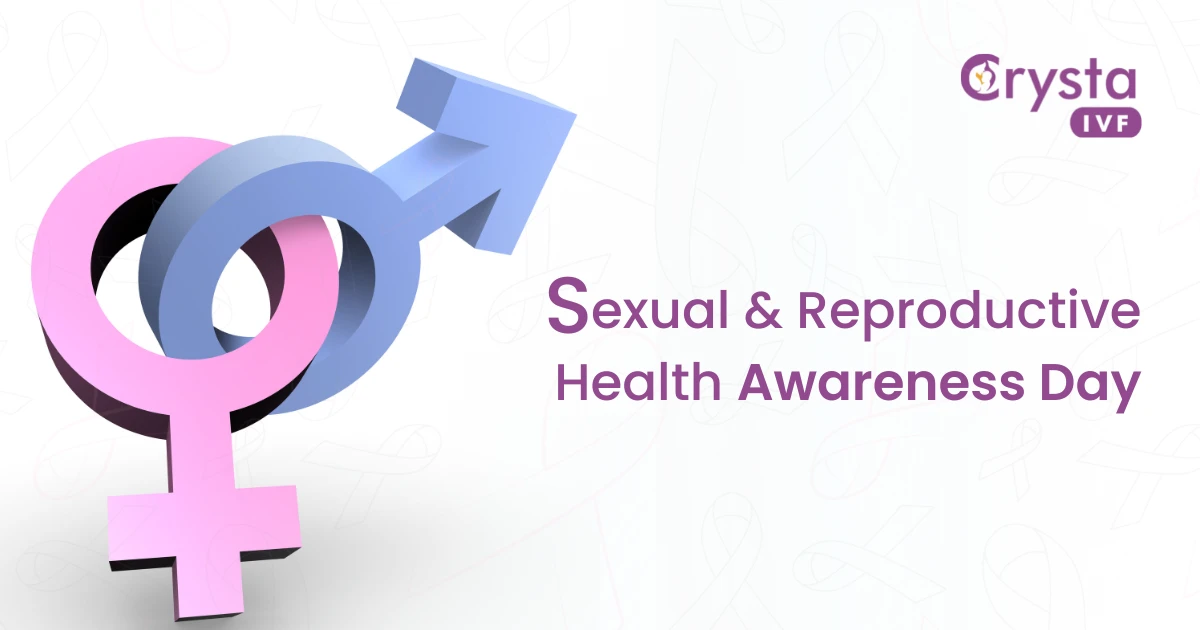Sexual and Reproductive Health Awareness Day is observed annually on February 12 aimed at promoting and educating people about the importance of sexual and reproductive health. This day sheds light on the significance of taking care of one’s sexual and reproductive health, which is often neglected or disregarded.
With the rise of sexually transmitted diseases, infertility, and other sexual health-related issues, it has become essential to encourage individuals to take control of their fertility health. Unfortunately, sexual and reproductive health can sometimes be a taboo subject, but that’s exactly why this day is so important.
So, let’s get started and learn about why sexual and reproductive health is so important and what we can do to keep ourselves healthy and happy!
The Importance of Reproductive Health Awareness
Have you ever thought about your reproductive health? It’s so important and often overlooked. In recent years, infertility has become a growing concern and a common issue, with one in eight couples experiencing difficulty conceiving.
Here are a few essential statistics that highlight the need of taking control of reproductive health:
- According to the World Health Organization (WHO), more than 48 million couples and 186 million individuals have infertility globally, and this number is expected to rise in the coming years.
- Another recent study estimated that the average sperm concentration fell from an estimated 101.2m per ml to 49.0m per ml between 1973 and 2018 – a drop of 51.6%.
- A study conducted by researchers at BHU Central University discovered that stress can lead to a decrease in sperm count and reduced sperm motility in men.
- Ovulation disorders, including polycystic ovary syndrome (PCOS), are responsible for 25-30% of all infertility cases.
Also read: Stress and Sperm: How Sub-Chronic Psychological Stress Can Affect Male Fertility
Therefore, it is crucial to understand your body and its reproductive health to prevent infertility and other reproductive health problems.
Understanding your menstrual cycle, the signs of ovulation, and the risk factors for infertility can help you make informed decisions about your fertility and overall health.
And don’t worry, understanding your body and reproductive health isn’t as hard as it sounds.
Keeping track of your menstrual cycle, knowing the signs of ovulation, and visiting your doctor for regular check-ups can all help. By taking control of your reproductive health, you can ensure that your body is healthy and able to fulfill your desired goals, whether that be starting a family or simply taking care of yourselves.
Learn More: What are the Phases of the Menstrual Cycle?
Addressing Key Sexual and Reproductive Health Concerns
Sexually transmitted infections (STIs):
STIs are a significant concern in today’s society and can have serious health implications if left untreated. To prevent the spread of STIs, it is important to practice safe sex, get tested regularly, and seek treatment if necessary.
Menstrual health:
Menstrual health is often neglected in discussions about reproductive health. Understanding the menstrual cycle, managing discomfort, and addressing any potential health issues can improve overall menstrual health and well-being.
Infertility:
Infertility can be a devastating issue for couples trying to start a family. Regular check-ups, understanding one’s reproductive health, and seeking treatment if necessary can help prevent infertility and improve chances of conceiving. Many ART clinics such as Crysta IVF are helping infertile couples achieve their dream of parenthood.
Sexual health problems:
Sexual health problems, such as sexual dysfunction or pain, can be addressed with the help of a fertility specialist. Seeking treatment can improve sexual well-being and overall health.
Reproductive cancers:
Reproductive cancers, such as cervical or ovarian cancer, can have serious health implications if left undetected. Regular screenings and preventive measures can help detect and prevent these cancers and ensure reproductive health and well-being.
Rights to Sexual and Reproductive Health:
Reproductive rights are an important aspect of reproductive health and well-being. Ensuring access to safe and legal abortion services, the right to choose their preferred method of family planning and contraception, and protection of reproductive rights, is crucial for individuals to make informed decisions about their reproductive health.
How to Promote Reproductive Health & Well-Being?
Promoting sexual and reproductive health and well-being is crucial for individuals to live happy and healthy lives. Here are some steps that can help –
Knowledge is power: Educating yourself and understanding your reproductive health is the first step in promoting well-being. Don’t hesitate to speak with your fertility doctor.
Get regular check-ups: Regular check-ups with a fertility expert and gynecologist can help detect and prevent any potential health issues.
Practice safe sex: Using protection during sexual activity is crucial in preventing the spread of sexually transmitted infections (STIs).
Stress Management: Various studies have found a connection between stress and poor reproductive health. Find ways to manage stress, such as exercise, meditation, or talking to a trusted friend or family member.
Promote awareness: Spread awareness about the importance of sexual and reproductive health among friends, family, and your community.
How Advanced Medical Technologies Are Reshaping the Reproductive Health Field & Its Treatment?
Advanced medical technologies have revolutionized the field of reproductive health and have helped countless individuals struggling with infertility. From in-vitro fertilization (IVF) to intracytoplasmic sperm injection (ICSI), these technologies have provided new options for couples who have difficulty conceiving.
In vitro fertilization (IVF) is a process where an egg is fertilized by sperm outside of the body, and the resulting embryo is transferred to the uterus. This has helped many couples who have struggled with infertility due to issues such as endometriosis, fallopian tube damage, or sperm problems.
On the other hand, Intracytoplasmic sperm injection (ICSI) is a technique used in conjunction with IVF to help couples who have difficulty conceiving due to low sperm count or poor sperm motility. In this process, a single sperm is injected directly into an egg, increasing the chances of fertilization.
And now, Artificial Intelligence (AI) & Cryopreservation are also contributing to the field of infertility and reproductive health making it easier for couples to start families.
By embracing these technologies and staying at the forefront of reproductive health research, we can continue to help couples start families and improve the overall well-being of individuals everywhere.
In a Nutshell
Sexual and Reproductive Health Awareness Day is a significant reminder of the importance of reproductive health as an integral aspect of overall health and well-being.
By being aware and making informed decisions, we can take control of our fertility health and improve our overall health.
Despite societal taboos, fertility clinics like Crysta IVF are creating awareness on a mass scale and helping couples make their parenthood dreams a reality. With the help of renowned fertility experts and the utilization of the latest technologies, the ART clinic is playing a crucial role in promoting reproductive health and improving fertility outcomes.
So, let us embrace this day and make a commitment to prioritize and improve our sexual and reproductive health, as well as the health of those around us.




